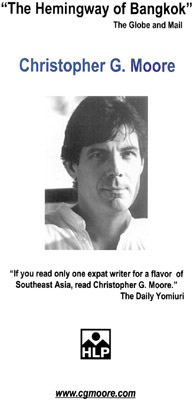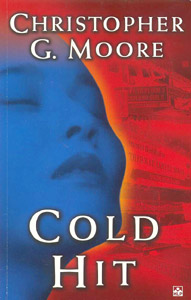
by

 "One of Canada's most successful novelists is almost unknown inside
Canada. But in Bangkok and other Asian cities, Christopher Moore has become
something of a folk hero among foreign workers and travelers. His 12 English
language novels have sold more than 20,000 copies in Bangkok alone. His Calvino
novels, detective stories with a cross-cultural flair, stand alongside Michael
Crichton or Steven King on the bookshelves from airports to shopping malls."
The Globe and Mail
"One of Canada's most successful novelists is almost unknown inside
Canada. But in Bangkok and other Asian cities, Christopher Moore has become
something of a folk hero among foreign workers and travelers. His 12 English
language novels have sold more than 20,000 copies in Bangkok alone. His Calvino
novels, detective stories with a cross-cultural flair, stand alongside Michael
Crichton or Steven King on the bookshelves from airports to shopping malls."
The Globe and Mail
Christopher
Moore is indeed one of the most prolific and well-known authors in Thailand
today. The majorities of his stories are set in contemporary Thailand and
provide a window on Thai life. His
first novel was The Lordshipís Arsenal,
he has written 12 novels since, and heís working on number 14 now. Six of
these books form the Vincent Calvino detective series, and one is a work of
non-fiction, Heart Talk. Scott Murray
recently attended a reading Moore gave at the Neilson Hays Library on Suriwong
Rd., close to the Chamber office. The following are excerpts from his talk.
Describing
how a writer spends his or her time, Moore says,
ďHours, days, weeks, months, alone in front of a word processor,
shaping and trying to control the strong heated disturbances and emotions of
characters into a believable. In other words, writing has many elements in
common with a bad marriage, except you are alone.
ďThe
hard part of the process is finding and developing the characters. The challenge
is to create a hero out of an ordinary character, exposing his flaws but making
him believable and credible. A good novel tells the truth about its hero, a bad
novel tells the truth about its author. Once the characters have been created,
then writing is a way of allowing them to struggle with all the problems, fears
and obstacles that stand between what those characters have and what they want
to possess in the story. The writer gives the characters memory, history, their
reason for doing things. At some stage of the writer process, the characters
begin to lead the writer, the writer follows that lead and in this dance the
novel is born. Novels are about deeply felt personal memories and emotions.
Personal memories, however, are soon used up for any writer, and emotions run
dry on recycled memories. A writer must be highly curious, and its through this
curiosity that the fountain of imagination is replenished A writer is constant
need of new material, fresh blood, fresh stories, and new characters. Moore
quotes Kingsley Amis `If you canít annoy somebody, there is no point in
writing,íĒ
|
|
| On writers & writing fiction, he says, ĎFor most writers, public speaking is somewhat of an ordeal, we treasure our privacy and solitude, and most of our working lives are spent in self-imposed seclusion. But when a book is launched, our lives change dramatically, as overnight, we find ourselves leaving this comfortable isolation to give interviews, readings and speeches.Ē |
ďI
think one of the reasons people write fiction is to explore their own personal
history, their background, their experience, their desires Ė to work through
the nature of their existence. Either write something worth reading, or do
something worth writing. Itís difficult to have time do both.
ďThe problem of writing a book of fiction is a navigational problem not unlike flying a small airplane at night where the pilot follows a vague shoreline in the fog without instruments. It is easy to lose oneís horizon, and at that point one can no longer tell up and from down, the sky from the ground, you are no longer in control of the plane, and you will likely crash. It is one thing to take off; itís another to land at a destination safely, whether you are a pilot or a writer. In the case of a writer, then finding a public that will pay to read about your journey is the ultimate test. I have always been slightly uneasy when someone has asked why I became a writer. It begs a different type of question, arenít we all writers? I have rarely met anyone who hadnít harbored a desire to write, who hadnít started a book of some sort, who hadnít written a short story, this is natural, we are all story-telling creatures in search of the right narrative voice, the right tone, the right set of characters. Writing I think is in everyoneís blood, but writing takes a great deal of concentrated time away from other activities in life and time is at a premium, diversions are everywhere. No one has enough time these days for writing, or reading, that most important adjunct to the writing process."
Moore has
written six books set centered on an ex-New York lawyer named Vincent Calvino
and his best friend, Thai Policeman Lieutenant Pratt.
He tries to keep the series fresh by bringing in new characters and
varying the settings. His novel,
Cut Out, is set in Cambodia during the time of UNTAC, Comfort
Zone is set in Bangkok and The Big
Weird is set in Bangkok. He usually begins a new book based on an actual
event. The new Calvino, Cold Hit, is
based on a story Moore read in the Bangkok
Post about a possible serial killer knocking off foreigners in Bangkok.
 |
Discussing Cold Hit, Moore says,ďMy
mission was to spend time with one of six ethnic Thais who work as LA Cops. I
liked the idea of developing a character based on an LA cop who happens to be an
ethnic Thai, who guided me through the Thai speaking nightworld of LA, which
proved to be an excellent portal to the Thais who live in Los Angeles and the
nature of their community. My original idea was take Calvino, the private eye
who lives in Bangkok, into this LA-Thai community, but after returning to
Bangkok, I decided it would work more effectively if I brought the LA-Thai cop
back to Thailand to make the Thais cop the fish out of water in Thailand.
Someone who was Thai but had become American, someone who remembered Thailand,
but no longer knew Thailand, and pair him with an American private eye who
remembered America, but no longer understood Americans. |
ďThere is a lesson on how Cold Hit evolved from a newspaper article into a 360-page book. While writing a novel, one should, as a writer, always keep the agenda open, and never force the story down a preconceived path. The Thai who was a stranger in his own culture was a premise I had never explored before, nor had I thought about it before going to Los Angeles. I had to go to LA., to that location, before I could discover the real story, one that would never have occurred to me if I had stayed in Bangkok.Ē
Cold
Hit sees Calvino and Jessie, the Thai L.A cop, teaming up as bodyguards to
protect an overweight American lawyer who looks like Truman Capote, and who runs
a single male Internet business. The lawyer is in Bangkok to close a deal on a
run-down hotel, and he arrives as a serial killer is dispatching foreigners.
ďOne of the great things about writing a novel is that you can do all kinds of
great things like planting a claymore mine in the Emporium shopping complex. The
book is set in Nana Plaza, Klong Toey and Sukhumvit Road, with a mixing of real
people, places, events and imaginary ones."
Many
foreigners have hard a time adapting to Asia and cannot fathom the Asian
lifestyle. Moore has a wonderful take on this. From his book, A
Haunting Smile he writes: ďTake
one sq. km of England and what do you find inside? Nine adults, three dogs, six
children, a couple of pubs and a church. Now take one sq. km of Asia: you find
3,000 families, 800 dogs, 200 monks and 400 generals. Everyone is bunched up,
squeezed together, stepping on each otherís feet, you canít move without
somebody noticing, you canít raise a concern without causing someone offense,
and the person you offend may have power. The social arrangements are designed
so that you donít give offense, you donít complain, you donít criticize
and you learn not to seek problems. The most efficient way of living is to move
with great caution, if you step forward from the place you stand always remember
people are watching, never move quickly forward or backward without honoring the
carnal rule of Asia: yield to those more powerful than you. Spontaneous behavior
is dangerous, you must take your time, one step at a time, so that those in
power donít become anxious. You learn to test the waters slowly, putting in
one toe at a time, it is better to lose a toe than a foot, it is better to lose
a foot than a leg. You master the art of moving without causing offense. One
small major step and then you stop and count your toes every step along the way,
thatís how you survive with all those people living on top of each other in
one sq. km of Asia. If you try to run through the territory as if itís a
western footrace, then you are in trouble.Ē
Ed Note: Moore has recently had a New York designer/illustrator create a new series of templates for his novels and he is also using a new Thai based publisher, Asia Document Bureau Ltd., under the imprint of Heaven Lake Press. To be honest, this has made a world of difference in the presentation of his novels. His books published by White Lotus were cumbersome and unattractive and there were many glaring typos. Moore has many critics, mostly fellow scribes, who are jealous of his success, but this new look will definitely help him gain the global audience he craves. Moore says his books have not been that well received in his native continent because North Americans can't be bothered with the development of Asian characters.
Email: chris@cgmoore.com
Website: www.cgmoore.com
FINIS